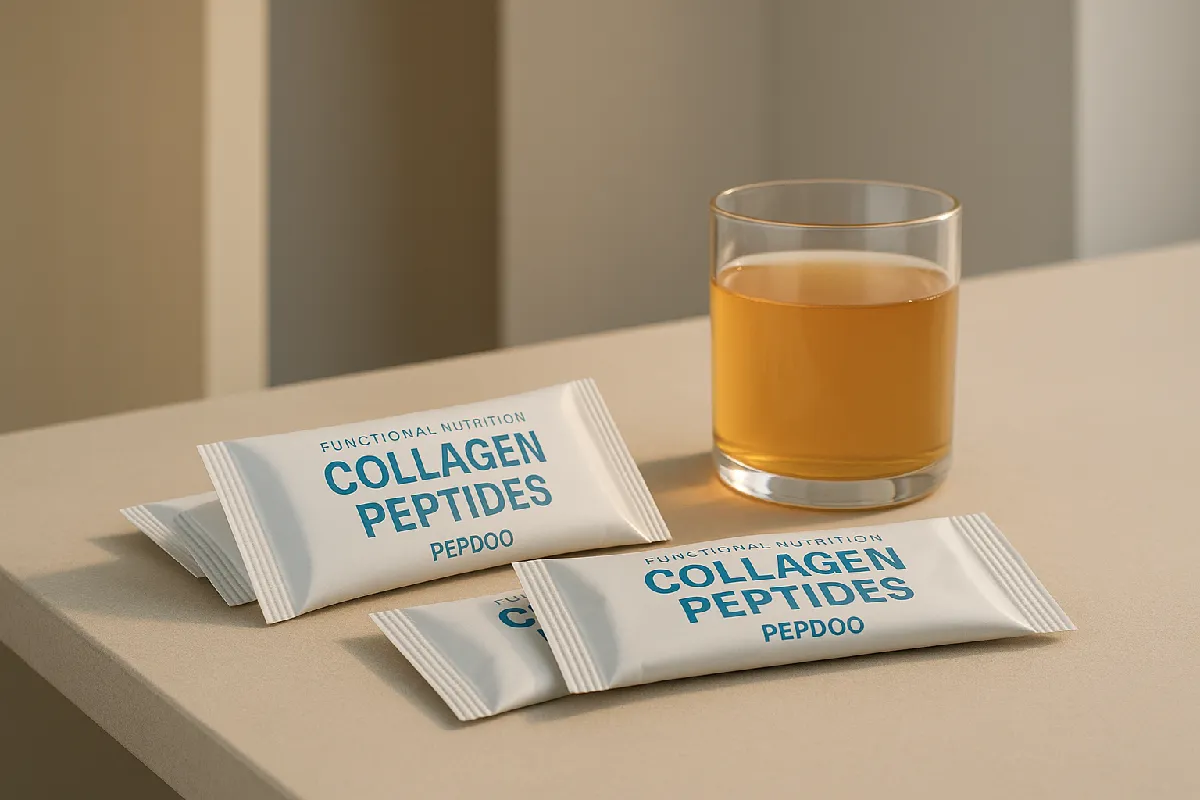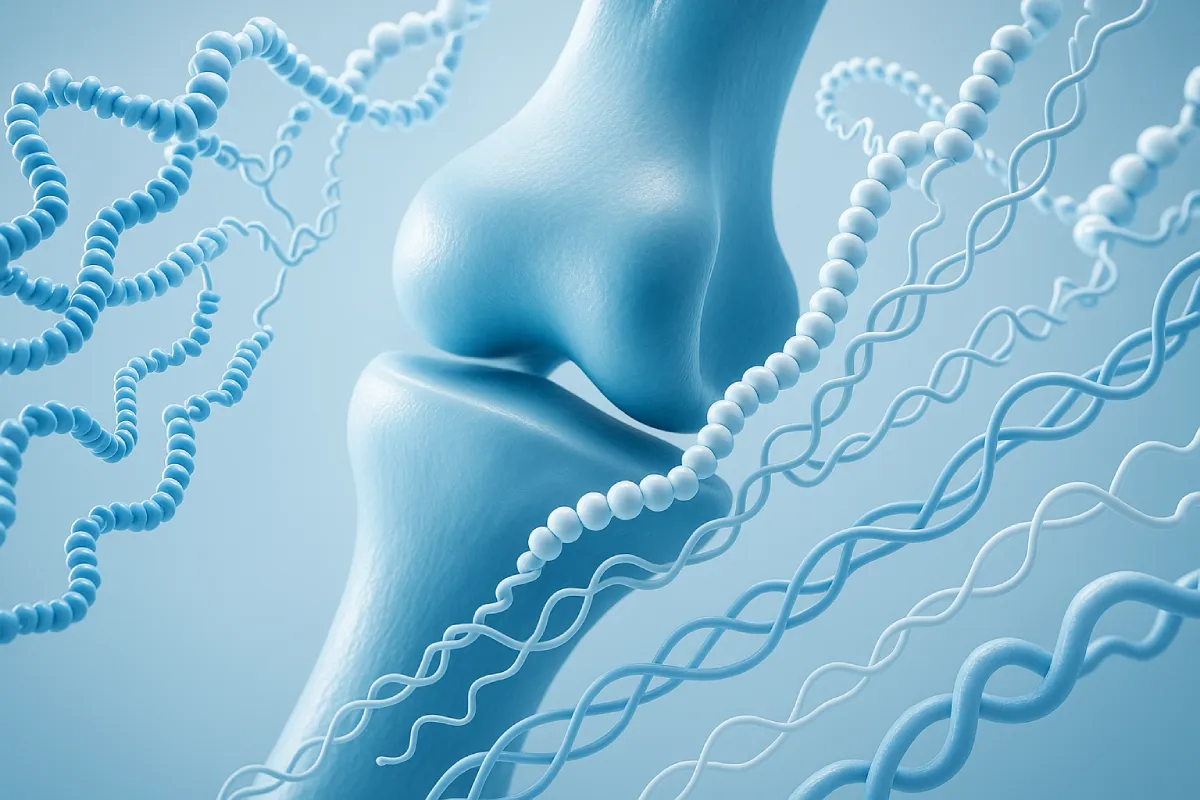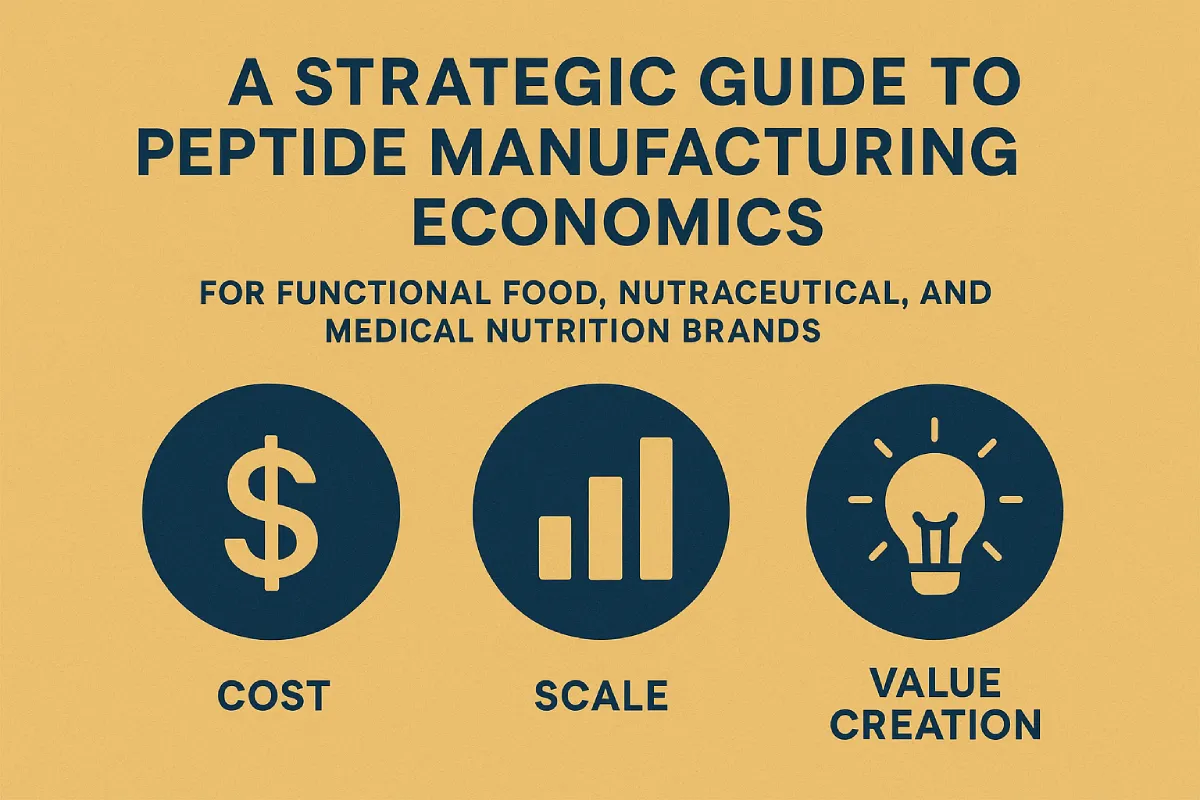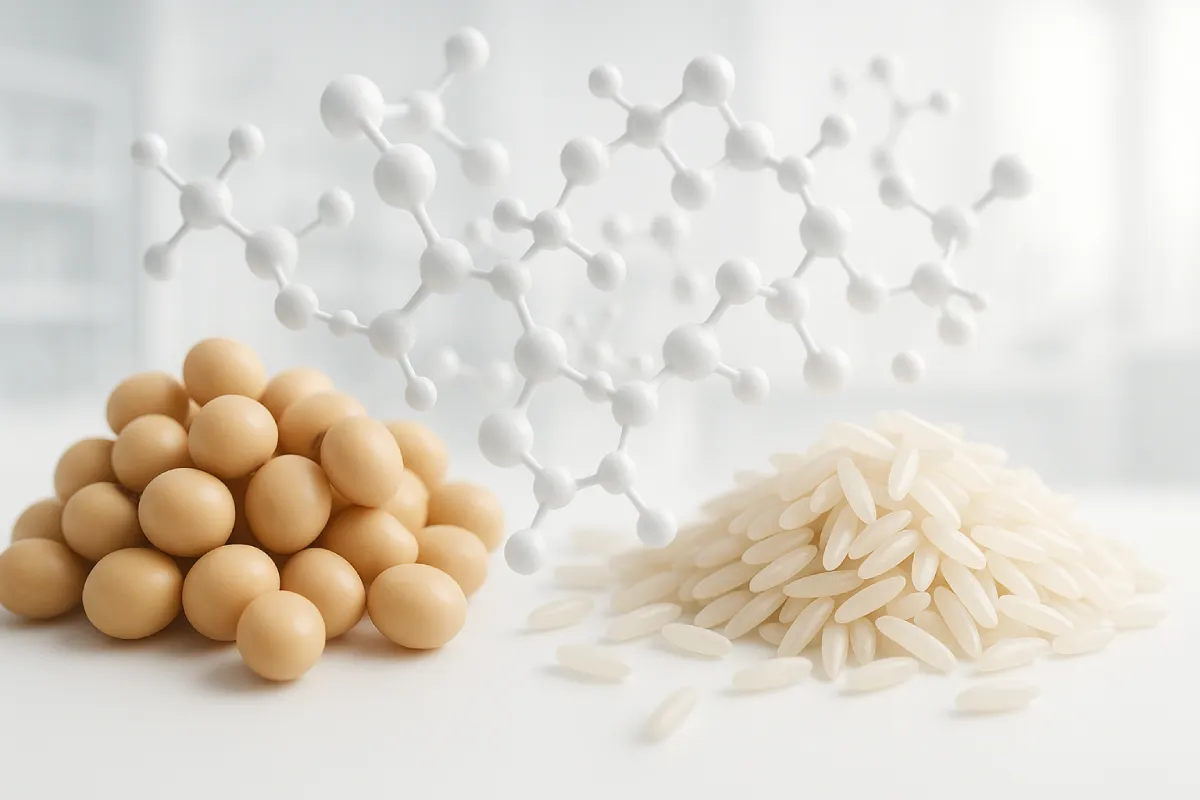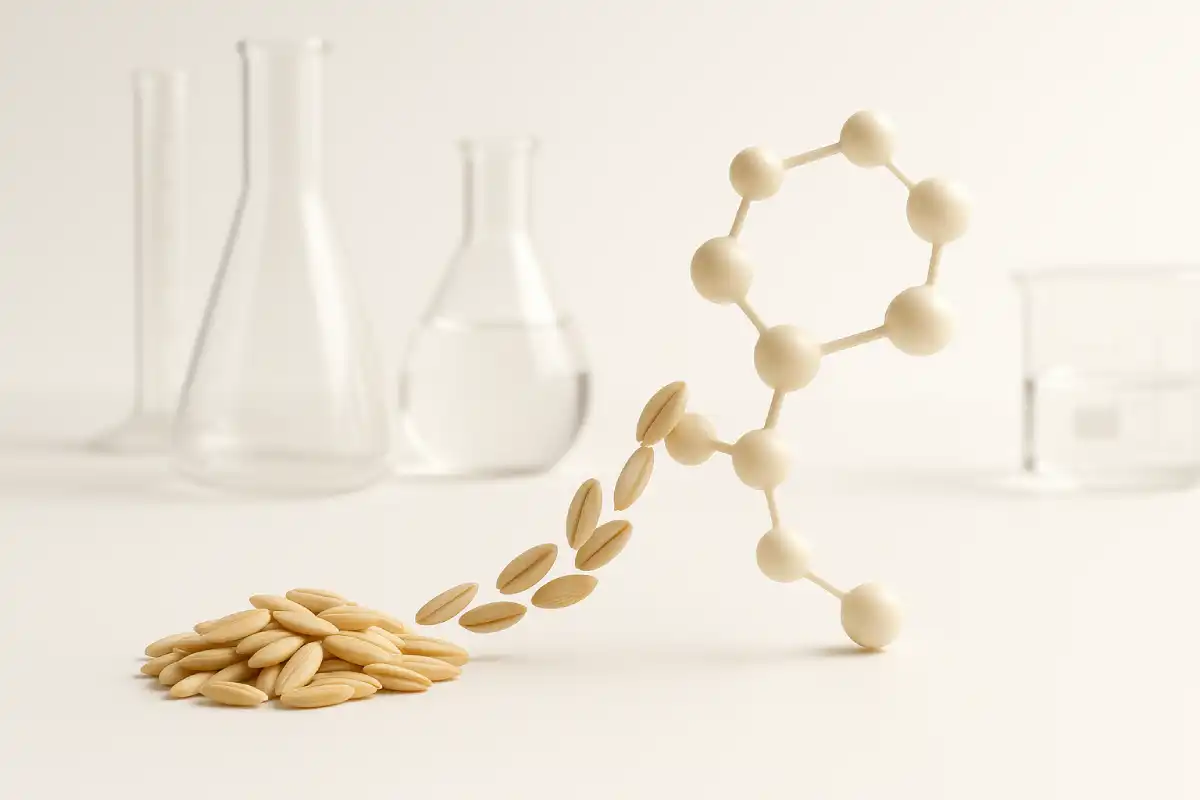Bovine Bone Collagen Peptide: A Proven Path to Bioavailable Joint Support
As the global demand for joint health solutions rises—driven by aging populations, active lifestyles, and clean-label expectations—formulators are seeking effective, bioavailable, and sustainable ingredients that deliver real results. One ingredient is standing out in the competitive landscape: bovine bone collagen peptide.
This article explores the science, sourcing, production advantages, and formulation strategies behind this high-potential joint support peptide, highlighting why working with a source manufacturer like PEPDOO® gives brands a decisive edge.
What Are Bovine Bone Collagen Peptides?
Bovine bone collagen peptides are short chains of amino acids derived from the enzymatic hydrolysis of cow bones—primarily rich in Type I and Type II collagen. Unlike gelatin or undenatured collagen, these peptides are hydrolyzed to low molecular weight (<3000 Da), making them more readily absorbed in the gastrointestinal tract [1].
This peptide format offers functional benefits that go beyond protein enrichment—it can stimulate cartilage repair, reduce inflammation, and support bone metabolism, making it a compelling addition to joint health supplements, beverages, and nutraceuticals.
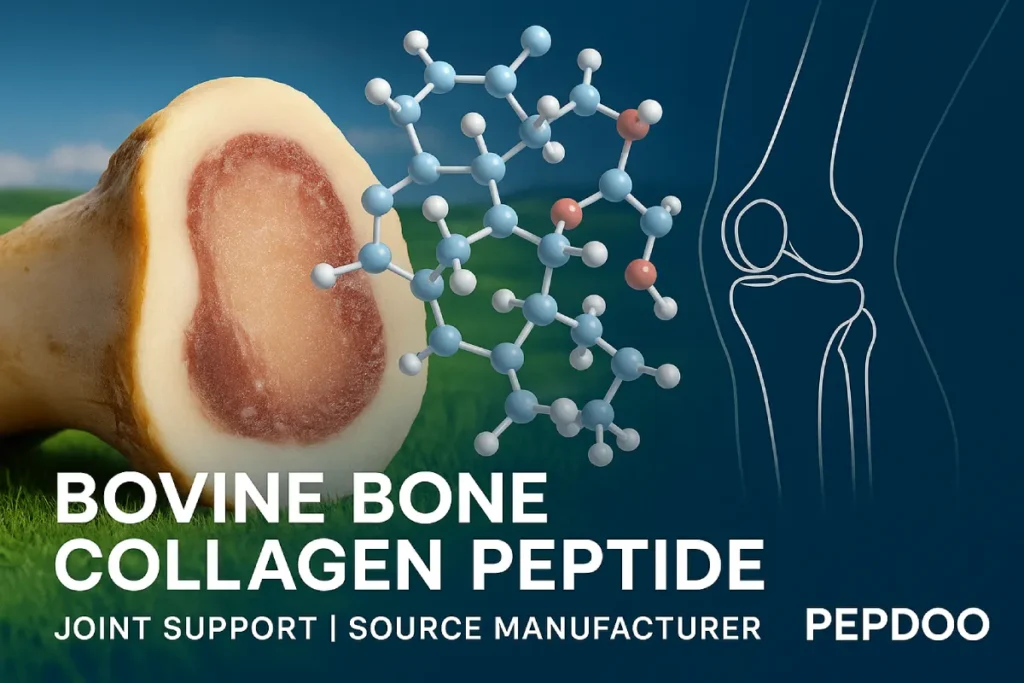
Why Bone Collagen for Joint Support?
1. Dual Collagen Types for Synergistic Action
Bovine skin collagen is largely composed of Type I collagen, while bovine bone collagen provides a natural combination of Type I and Type II collagen. This duality is essential—Type II is the dominant collagen in articular cartilage, and Type I supports bone structure and strength [2].
Combined, they deliver synergistic joint-health support that’s difficult to match with skin-derived collagen alone.
2. Bioactive Peptides That Trigger Cartilage Repair
Key bioactive sequences like Pro-Hyp, Gly-Pro-Hyp, and Hydroxyproline-rich peptides have been shown to stimulate chondrocyte proliferation and extracellular matrix synthesis [3]. In one in vitro study, collagen peptides increased Type II collagen expression by up to 35% in human chondrocytes [4].
Scientific Validation: Human & Animal Evidence
Collagen peptides from bovine bone are supported by a growing body of evidence:
- In a 12-week randomized clinical trial, older adults with mild knee osteoarthritis who consumed 10 g/day of bone collagen peptides showed significant improvement in WOMAC pain and stiffness scores compared to placebo (Δ−18%) [5].
- Animal models confirm cartilage regeneration and reduced inflammatory cytokines such as IL-6 and TNF-α after 8 weeks of supplementation [6].
These findings position bovine bone collagen peptide as a scientifically substantiated ingredient with real-world efficacy.
Sourcing Matters: Why Choose a Source Manufacturer?
In the collagen peptide supply chain, not all suppliers are created equal. Working with a source manufacturer like PEPDOO®—who controls the entire process from raw bone to final spray-dried peptide powder—provides multiple advantages:
✔ Traceable Raw Material
PEPDOO® sources bones only from grass-fed, BSE-free cattle, with full animal origin documentation and Global GAP certifications.
✔ Multi-Enzyme Hydrolysis, In-House
Our proprietary multi-enzyme hydrolysis method enables precise control over molecular weight distribution and bitterness reduction—key to both bioavailability and taste. No subcontracted processing.
✔ Food-Grade & Pharma-Grade Standards
The final product meets HALAL, Kosher, ISO 22000, and HACCP certifications, with heavy metal and microbial specifications conforming to EU and US pharmacopeias.
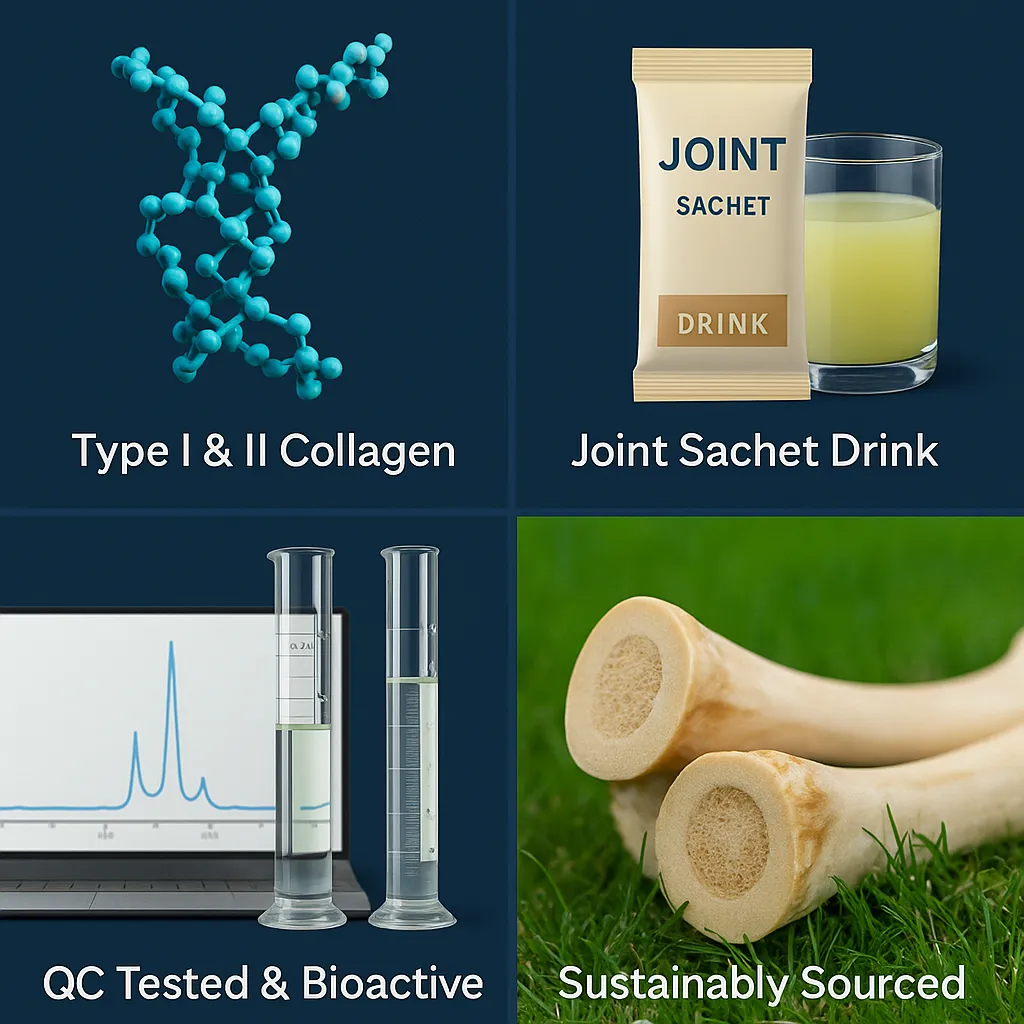
Functional Benefits for Formulators
| Mechanism of Action | Health Benefit | Data Support |
|---|---|---|
| Stimulates chondrocyte activity | Cartilage regeneration | +35% Type II collagen [4] |
| Suppresses IL-6, TNF-α | Reduces inflammation | Animal model [6] |
| Enhances osteoblast differentiation | Bone support | +22% ALP expression [7] |
These outcomes make bovine bone collagen peptides a versatile option for both aging populations and active consumers seeking long-term joint resilience.
Ideal Applications and Formulation Tips
Bovine bone collagen peptide is compatible with a wide range of health products:
- 🧃 Joint-health sachet drinks (e.g., 5 g collagen + hyaluronic acid + curcumin)
- 💊 Effervescent tablets or capsules for seniors
- 🥤 RTD functional beverages with clean-label positioning
- 🍬 Gummies fortified with calcium and vitamin D3
Key technical specs:
- Neutral flavor, >95% solubility in cold water
- Stable at pH 3–8 and under pasteurization
- Typical daily dosage: 2.5–10 g
- MW range: 0.5–3 kDa (customizable)
Regulatory Overview & Market Access
PEPDOO®’s bovine bone collagen peptides are:
- ✅ GRAS self-affirmed in the United States
- ✅ Listed in the EU Novel Food catalog (exempt from authorization)
- ✅ Eligible for Blue Hat Health Food filing in China
- ✅ Compliant with ASEAN and GCC standards
This simplifies formulation for brands targeting multiple international markets.
Sustainability & Clean-Label Advantage
Sourcing from bovine bones is not only cost-efficient—it’s also environmentally responsible. By upcycling food-industry by-products, we reduce landfill waste and water use per unit of protein produced [8].
PEPDOO® is committed to:
- Carbon-neutral production by 2026
- Clean-label formulation support (no additives or preservatives)
- Full lifecycle traceability for eco-conscious branding
Why Partner with PEPDOO®?
As a true source manufacturer, PEPDOO® delivers unmatched control over quality, purity, and customization.
- 🏭 6,000 MT annual capacity, fully integrated facility
- 🔬 In-house R&D and pilot plant for co-formulation
- 🌍 Global distribution from hubs in Europe, North America & Asia
- 📊 Custom peptide profiles, molecular fingerprinting, and tech dossiers available
“We don’t just supply collagen peptides—we engineer joint-health solutions from the ground up.”
🦴 Ready to Co-Create the Next Joint Health Breakthrough?
Connect with the PEPDOO® Technical Team for bulk supply, sample requests, or customized peptide solutions.
We help brands formulate clean-label, science-backed products using source-manufactured bovine bone collagen peptides.
Response guaranteed within 1 business day.
FAQ
PEPDOO® is a source manufacturer with full-process control from raw material sourcing, enzymatic hydrolysis, to spray-drying and quality assurance. Our collagen peptides feature high purity, consistent bioactivity, and traceability, ensuring superior joint support efficacy and regulatory compliance for global markets.
Our product meets stringent quality standards including >90% bioactive peptide content, low heavy metal and microbial limits. We hold ISO 22000, GMP, and HACCP certifications, supporting your brand’s safety and quality requirements.
Yes, leveraging advanced multi-enzyme hydrolysis technology, we offer tailored peptide molecular weight distributions and peptide fingerprint profiles to meet specific formulation needs such as improved absorption, solubility, or taste masking.
Widely used in joint health supplements, functional beverages, nutraceutical capsules, and sports nutrition products, it delivers effective support for cartilage, tendons, and overall mobility, favored by formulators targeting active aging and wellness markets.
With an annual capacity exceeding 6,000 MT and vertically integrated manufacturing, PEPDOO® ensures stable supply, on-time delivery, and volume scalability. We also provide comprehensive technical support and regulatory documentation to facilitate smooth market entry.
We conduct in vitro bioactivity assays, stability studies, and have literature-backed clinical evidence for joint health benefits. All batches come with COA (Certificate of Analysis), and we support client audits and third-party testing upon request.
Please contact our sales team via the website inquiry form or direct email. We offer flexible MOQ terms, pricing based on order volume, and can arrange samples and technical dossiers to assist your product development.
References
- Bello, A. E., & Oesser, S. (2006). Collagen hydrolysate for the treatment of osteoarthritis and other joint disorders. Current Medical Research and Opinion, 22(11), 2221–2232. https://doi.org/10.1185/030079906X148373
- Wu, J., Fujioka, M., Sugimoto, K., & Mu, G. (2004). Assessment of effectiveness of collagen peptides on bone metabolism in growing and ovariectomized rats. Journal of Nutritional Science and Vitaminology, 50(6), 491–496.
- Iwai, K., Hasegawa, T., Taguchi, Y., Morimatsu, F., Sato, K., & Nakamura, Y. (2005). Identification of food-derived collagen peptides in human blood after oral ingestion of gelatin hydrolysates. The Journal of Agricultural and Food Chemistry, 53(16), 6531–6536.
- Schadow, S., et al. (2013). Collagen hydrolysate stimulates expression of cartilage extracellular matrix genes in human chondrocytes. PLoS One, 8(1), e53955.
- Zdzieblik, D., et al. (2017). Collagen peptide supplementation improves joint health in active elderly men: a randomized controlled trial. Nutrition Journal, 16(1), 30.
- Du, Y., et al. (2019). Anti-inflammatory effects of collagen peptides from bovine bone on LPS-induced inflammatory responses in mice. Journal of Functional Foods, 52, 642–650.
- Choi, S. Y., Ko, E. J., Lee, Y. H., Kim, B. G., Shin, H. J., & Seo, D. B. (2013). Effects of collagen tripeptide supplement on skin properties: A prospective, randomized, controlled study. Journal of Cosmetic and Laser Therapy, 16(3), 132–137.
- Guo, L., & Zhao, M. (2021). Sustainability evaluation of collagen peptide production using bovine by-products. Food and Bioproducts Processing, 127, 139–147.


